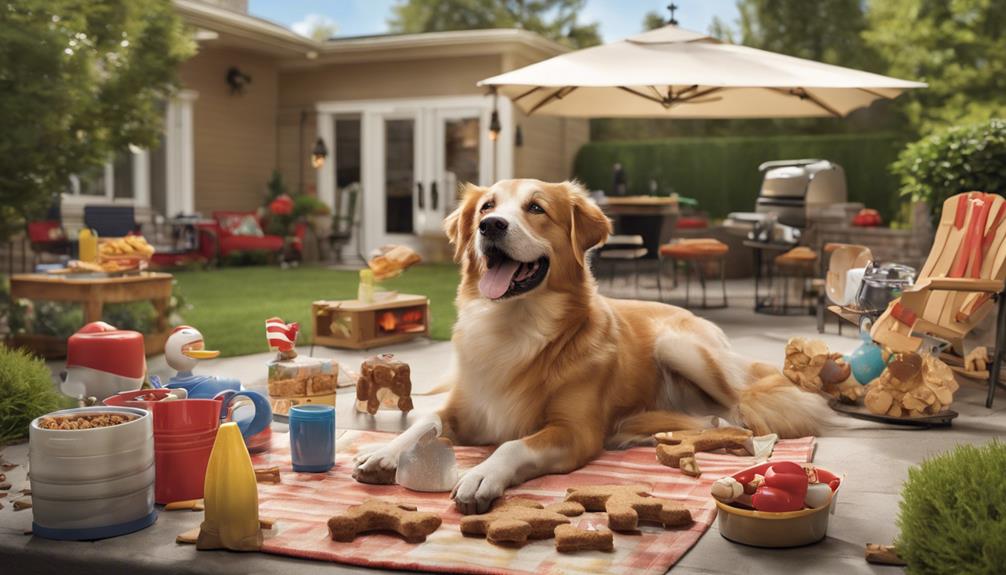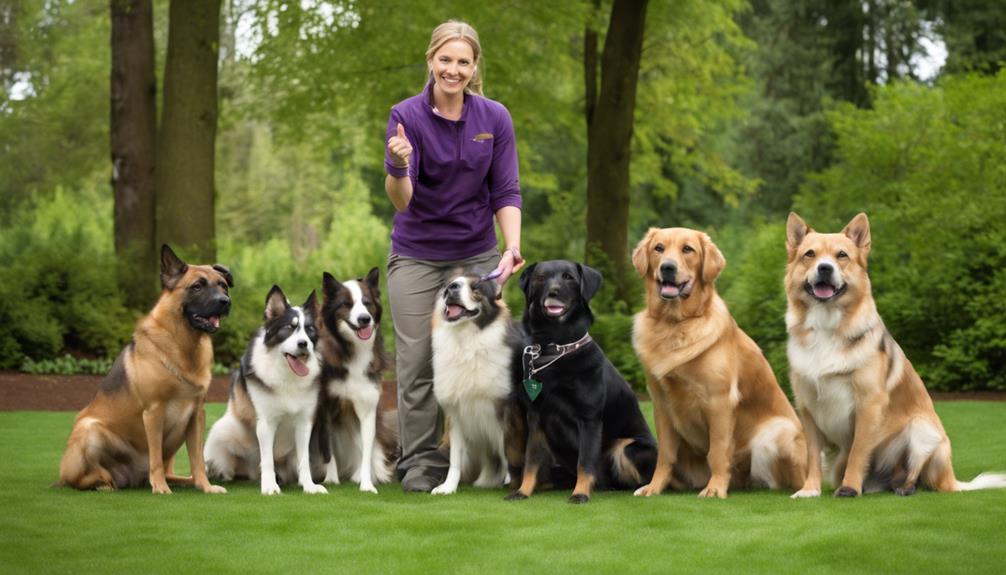When it comes to BBQs, we must guarantee our furry friends' safety. Dogs should stay away from the grill to prevent burns. Keep grilling tools out of their reach. Opt for safe foods like plain meats or veggies for treats. Avoid fatty meats, cooked bones, or raw options. Monitor serving sizes to avoid overeating and obesity. Steer clear of harmful ingredients like onions and garlic. For a well-rounded diet, include proteins, carbohydrates, and fats. Seek advice from a vet for specific dietary requirements. To secure your dog's safety during BBQs, follow these guidelines closely.
Key Takeaways
- Keep dogs away from the grill to prevent burns or injuries.
- Offer safe food options like plain, boneless meats.
- Avoid toxic ingredients like onions and garlic in BBQ sauce.
- Monitor portion sizes to prevent overeating and maintain a balanced diet.
- Consult a vet for specific dietary needs and portion recommendations.
BBQ Safety Tips for Dogs
To guarantee your furry friend stays safe during BBQ gatherings, keep them away from the grill to prevent burns or injuries. Dogs can get curious around the BBQ, so make sure they're at a safe distance to avoid accidents.
Store grilling accessories out of your pet's reach to prevent any mishaps. It's important to be cautious about the foods you feed your dog during BBQs to maintain their safety. Make sure all ingredients are cleaned thoroughly to prevent harmful bacteria consumption.
Avoid feeding your pet uncooked meats, onions, hotdogs, chicken wings, and corn on the cob as these can be toxic or pose choking hazards. By being mindful of the foods your dog consumes and keeping them away from the grill, you can ensure a safe and enjoyable BBQ experience for both you and your furry companion.
Safe BBQ Foods for Dogs
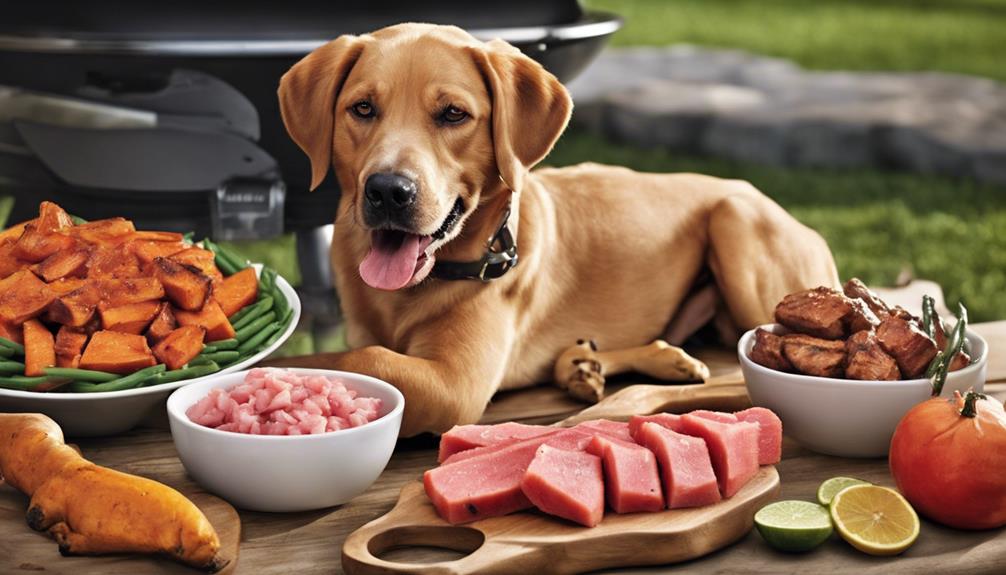
During BBQ gatherings, it's important to offer dogs with safe food options to guarantee their well-being and enjoyment. Dogs can safely indulge in plain, boneless, and well-cooked meats such as chicken, turkey, lean beef, and fish at a BBQ. These protein sources can be a healthy addition to their diet.
Vegetarian alternatives like plain, well-cooked sweet potatoes are also a safe choice for dogs, offering a mix of nutrients. For a revitalizing treat, consider offering seedless watermelon or blueberries, which can be both safe and enjoyable for your furry friend.
When selecting foods for your dog at a BBQ, it's important to steer clear of fatty meats, cooked bones, and raw or undercooked meats that could pose risks to their health. Being mindful of the foods you provide not only ensures your dog's safety but also contributes to their overall well-being during the BBQ festivities.
Dangerous BBQ Foods for Dogs
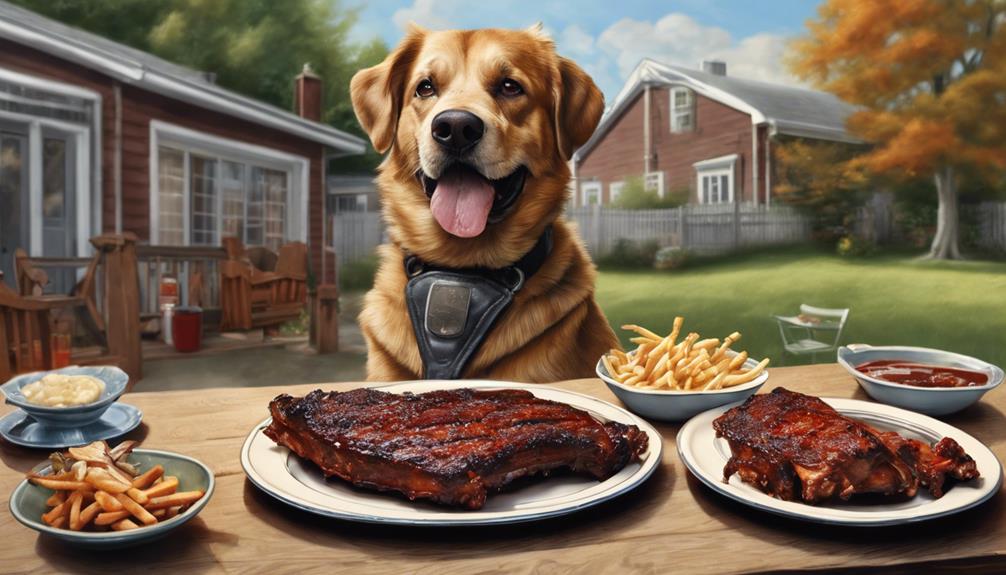
When thinking about BBQ foods that can be harmful for dogs, it's important to be mindful of certain items that could pose risks to their health. Some dangerous BBQ foods for dogs include fatty meats like ribs, certain cuts of steak or pork, cooked bones, and raw meat. Cooked bones from BBQ meats can splinter, causing blockages or injuries in dogs. Small bones, such as poultry bones, are a choking hazard, while large, dense bones can lead to dental damage. Additionally, raw or undercooked meat from BBQ can harbor harmful bacteria that may make dogs sick. To help you identify these risky foods more easily, here's a table summarizing the dangerous BBQ items for dogs:
| Dangerous BBQ Foods | Risks for Dogs |
|---|---|
| Fatty meats | Digestive issues |
| Cooked bones | Blockages or injuries |
| Raw meat | Bacterial infections |
| Choking hazard | Dental damage, choking |
Monitoring Portion Sizes for Dogs
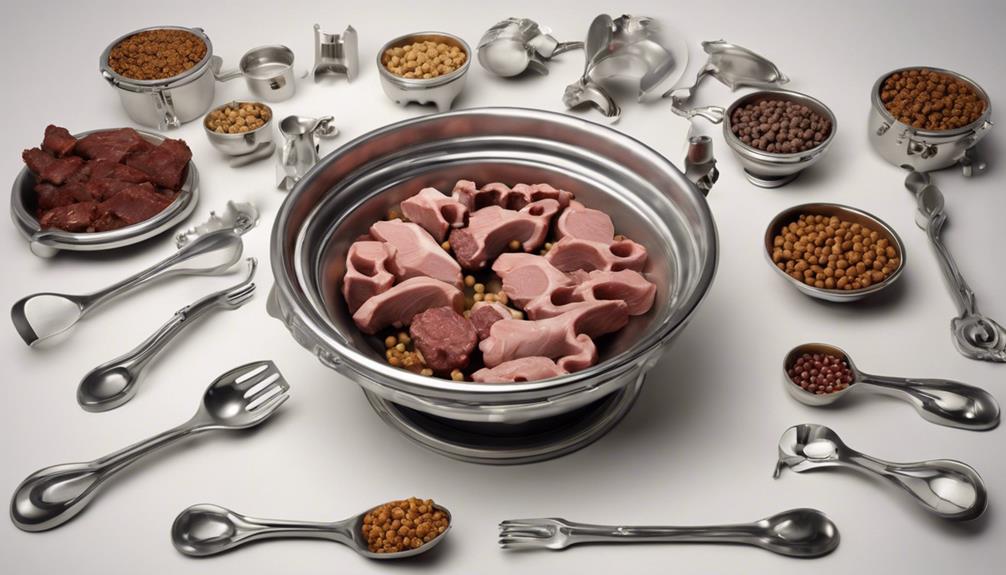
Managing portion sizes is crucial for guaranteeing dogs maintain a healthy diet when enjoying BBQ. Portion control plays an important role in monitoring your dog's food intake to prevent overeating and digestive issues. It helps in maintaining a balanced diet, reducing the risk of obesity-related health problems that can arise from excessive calorie intake.
When offering BBQ to your furry friend, remember that it should be an occasional treat rather than a regular meal. Consulting a veterinarian for specific portion recommendations based on your dog's size, age, and health condition is highly recommended. Veterinarians can provide tailored guidance to ensure your dog stays healthy while still enjoying the occasional BBQ treat.
Avoiding Toxic Ingredients in BBQ
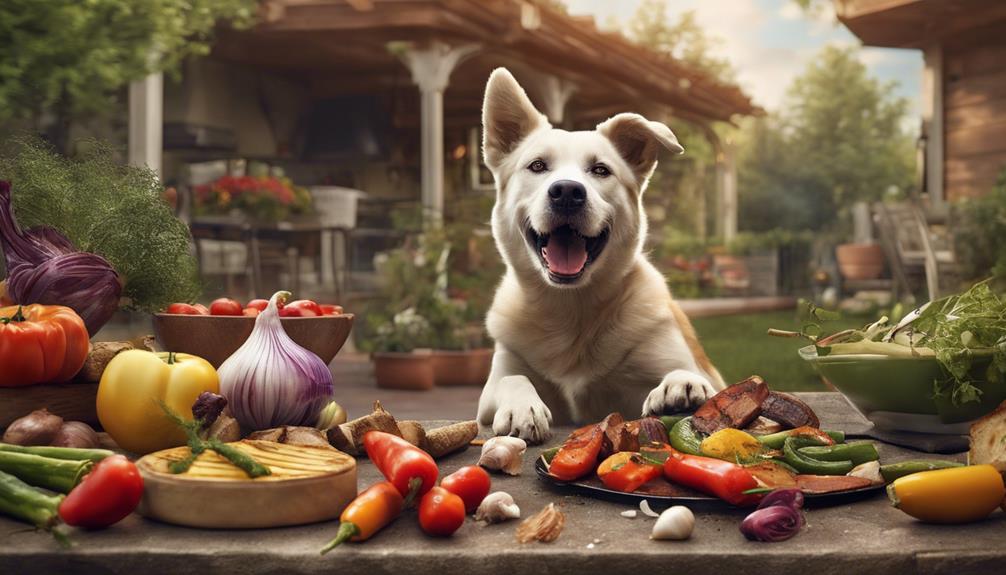
How can we guarantee our dogs stay safe during BBQ season by sidestepping toxic ingredients in BBQ? When it comes to BBQ sauce, there are several ingredients that can be harmful to our furry friends. Onions and garlic, commonly found in BBQ sauce, contain compounds that can damage dogs' red blood cells. Additionally, the high sugar and salt content in BBQ sauce can lead to digestive issues and even obesity in dogs. The spices often used in BBQ sauces may also cause gastrointestinal problems, resulting in discomfort and potential health issues for your pet.
To guarantee the safety of your dog during BBQ season, it's best to avoid feeding them BBQ sauce altogether. Instead, opt for pet-friendly BBQ sauce recipes or stick to plain, unseasoned options. Here is a table highlighting the toxic ingredients to avoid and some safer alternatives:
| Toxic Ingredients | Safer Alternatives |
|---|---|
| Onions and Garlic | Pet-friendly BBQ sauces |
| High Sugar and Salt | Plain, unseasoned options |
| Spices | Homemade, dog-safe recipes |
Grilling Tips for Pet Safety
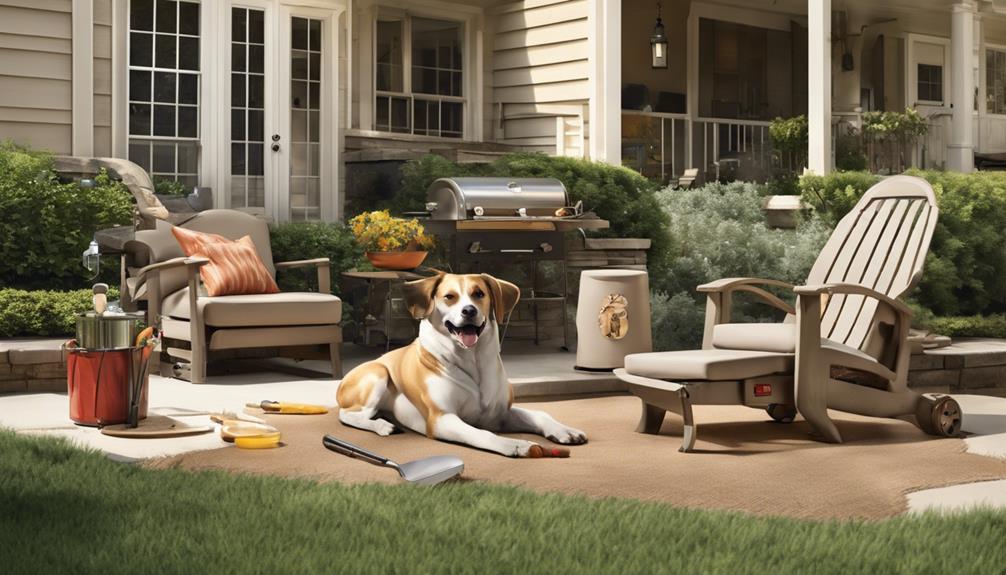
When grilling for your furry friends, make sure the grill heat distance is safe to prevent burns. Use pet-friendly ingredients like lean meats and veggies, and avoid harmful items such as onions or chicken wings.
Remember to cool down foods properly before sharing them with your pet to prevent any accidents or injuries.
Grill Heat Distance
To guarantee the safety of our furry companions, it is vital to uphold a distance of at least 3 feet between pets and the grill to prevent potential burns and injuries. The grill's heat can soar above 500°F, posing a severe danger to our pets if they get too close. Below is a table summarizing key points for maintaining a safe distance and ensuring your pet's well-being around the grill:
| Safety Measure | Importance | Action |
|---|---|---|
| Keep pets 3 feet away from the grill | Prevents burns and injuries | Create a designated pet-free zone |
| Supervise pets near the grill | Ensures their safety | Stay vigilant at all times |
| Store propane tanks securely | Prevents fire hazards | Secure tanks in a safe location |
Pet-Friendly Ingredients
After guaranteeing the proper distance between pets and the grill to prevent burns and injuries, it's vital to focus on selecting pet-friendly ingredients for safe grilling. Opt for plain, boneless meats like chicken, turkey, or fish as they're safe options for pets.
Avoid using seasonings, sauces, or oils on ingredients such as sweet potatoes, zucchini, or lean meats during BBQs to ensure pet safety. Keep grilled vegetables plain and free of dressings or seasonings. Choose small portions of grilled boneless meats or vegetables to prevent digestive issues in pets.
It's important to supervise pets around the grill to prevent accidents and make sure they stay away from potentially harmful foods or ingredients.
Food Cooling Precautions
Let's make sure that grilled foods cool to room temperature before offering them to our pets to prevent burns or mouth injuries.
Using separate utensils for pet food helps avoid cross-contamination with unsafe foods or seasonings.
Storing leftover grilled foods promptly in the refrigerator is crucial to prevent bacterial growth and potential foodborne illnesses in pets.
Remember to never leave grilled foods unattended where pets can access them, as they may contain bones or other hazards.
Be cautious of hot surfaces around the grill that can cause burns to your pet's paws or mouth if they get too close.
Consulting a Vet Before BBQ
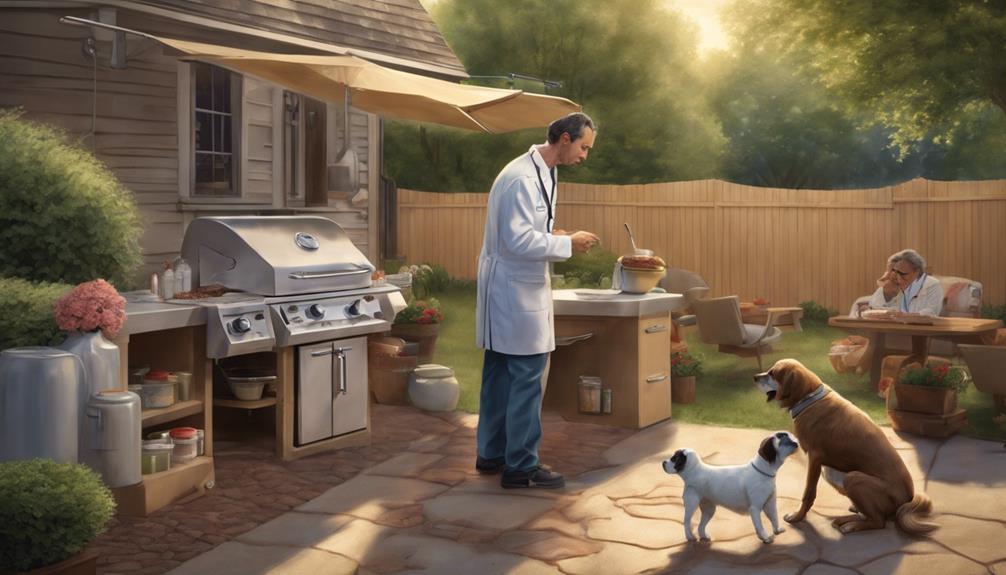
Before firing up the grill for your furry friend, it's crucial to consult a vet.
They can offer valuable advice on safe BBQ practices and identify any ingredients to steer clear of.
Vets BBQ Safety Advice
Seeking guidance from a veterinarian before introducing barbecue foods to your dog is crucial for their safety and well-being. Vets can offer personalized advice tailored to your dog's specific needs, such as breed, age, health conditions, and dietary requirements. They provide safety tips on which BBQ foods are safe and in what portion sizes.
Vets can also identify potential allergens or toxic ingredients that could harm your furry friend. By consulting with a vet, you can prevent allergic reactions and digestive issues in your dog. Their expert guidance guarantees that you make informed decisions and prioritize your dog's health when it comes to incorporating BBQ into their diet.
BBQ Ingredients to Avoid
After consulting with a veterinarian, it becomes clear that certain BBQ ingredients must be avoided to guarantee the safety and well-being of our dogs. Onions and garlic are toxic ingredients often present in BBQ sauces that can harm our furry friends.
High sugar levels in BBQ sauces can lead to obesity and digestive issues in dogs. Additionally, spices found in BBQ sauces might cause digestive problems or allergic reactions in some dogs.
It's important to steer clear of artificial sweeteners like xylitol as they're harmful to dogs. Before sharing any BBQ foods with your dog, consult a vet to confirm their safety and prevent any potential health risks.
Prioritizing your dog's health by avoiding these harmful ingredients is vital for their overall well-being.
Maintaining Balanced Diet for Dogs
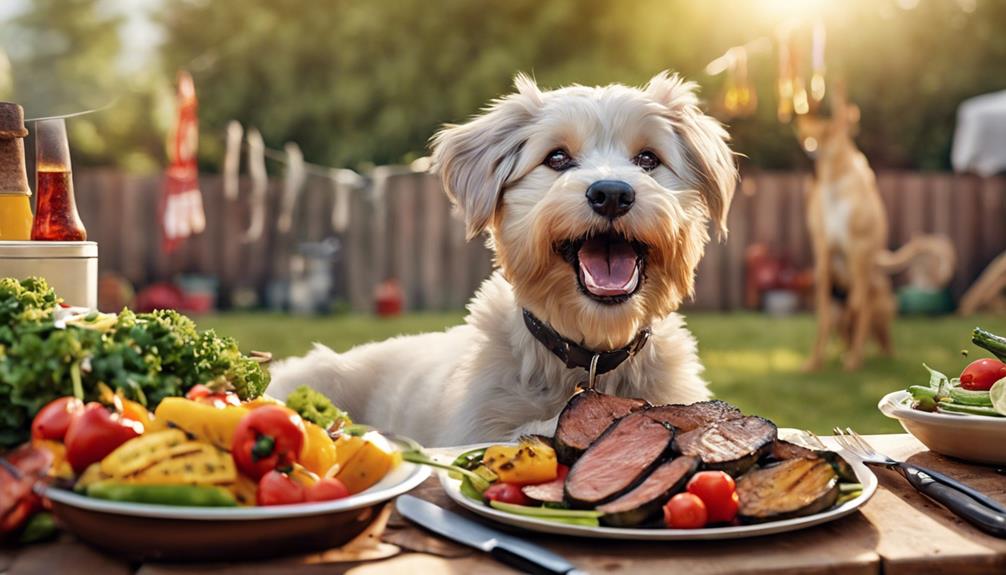
To maintain peak health, dogs require a balanced diet that includes high-quality animal proteins, carbohydrates, fats, vitamins, and minerals. A dog's food should consist of protein sources like meat, fish, and eggs to support muscle growth and repair. Carbohydrates from vegetables, fruits, and whole grains provide energy and fiber for good digestion in dogs.
Vital fats from sources like fish oil or flaxseed oil are essential for a dog's skin, coat, and immune function. Ensuring that your dog's diet includes these essential nutrients will help them stay healthy and energetic. It's important to avoid feeding dogs foods that are high in unhealthy fats, sugars, and artificial ingredients, as these can lead to health issues.
Consulting with a veterinarian can help you determine the specific dietary needs of your dog based on factors such as age, breed, size, and activity level. By providing a well-balanced diet, you can help your furry friend live a long and happy life.
Frequently Asked Questions
Is It Safe for Dogs to Eat Barbecue?
Yes, it's generally safe for dogs to eat barbecue, but certain precautions are essential. Stick to plain grilled meats like chicken, turkey, or fish.
Avoid toxic ingredients in BBQ sauces, such as onion and garlic. Watch portion sizes and steer clear of cooked bones and fatty meats.
Always consult a vet if unsure about specific foods for your dog. A balanced diet is key, so offer BBQ treats in moderation for their well-being.
Is Grilled Food Safe for Dogs?
Grilled food can be safe for dogs when served without harmful seasonings or marinades. Stick to plain, boneless meats like chicken or turkey to avoid potential health risks.
Grilled veggies without oils or dressings are also a healthy option. Remember to watch portion sizes to prevent digestive issues.
When in doubt, consult a vet to guarantee your furry friend's well-being. We always prioritize our pets' safety and health when it comes to their diet.
Can Dogs Be Around BBQ Smoke?
Yes, dogs can be around BBQ smoke, but it may pose health risks due to harmful chemicals like PAHs. Dogs with respiratory issues are more sensitive, possibly experiencing irritation, coughing, or breathing difficulty.
To minimize risks, guarantee proper ventilation, and seek vet advice if needed. Balancing BBQ enjoyment and pet safety is key. Be mindful of your dog's well-being when enjoying BBQ to prevent potential health issues.
Can My Dog Eat BBQ Steak?
Yes, dogs can eat BBQ steak safely in small, plain, boneless, well-cooked portions. It's important to avoid seasoned, saucy, or high-fat cuts to prevent digestive issues.
Always cut grilled steak into bite-sized pieces to minimize choking risks. After eating, monitor your furry friend for any signs of discomfort or digestive problems.
Conclusion
To sum up, dogs can savor BBQ safely with proper precautions. By adhering to safety tips, offering safe foods, monitoring portion sizes, and steering clear of toxic ingredients, you can guarantee your furry friend stays healthy and happy during BBQ season.
Remember to consult with your vet before introducing BBQ into your dog's diet and maintain a balanced diet overall. With these guidelines in mind, you can enjoy delicious BBQ with your canine companion worry-free.
